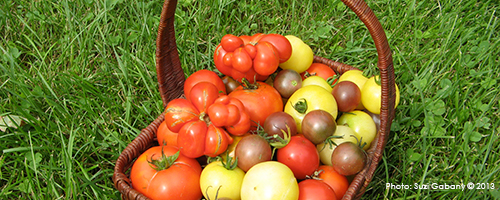Recently I was asked by a home gardener about using Epsom Salts to improve the growth of both foliage and fruit on tomatoes and peppers in the garden and foliage and flowers on roses. I have heard people talk about the wonders of Epsom Salts but I hadn’t fully researched it’s use. I decided to do so and here is what I found:
First of all, I discovered that Epsom Salts are not salts at all. Epsom Salts are natural mineral deposits found in the water in Epsom England. Their chemical composition is hydrated magnesium sulfate (about 10% magnesium and 13% sulfur). In order to germinate, seeds need magnesium. It is also critical for the production of chlorophyll, fruit and nuts. Magnesium also helps to strengthen cell walls and improves the plant’s ability to take up nitrogen, phosphorus, and sulfur.
Sufur is a key element to plant growth in the production of vitamins, amino acids and enzymes. It also gives foods like broccoli and onions their flavour. Sulfur, however is seldom lacking in the garden soils in this country because of acid rain and the application of animal manures which contain sulfur.
Magnesium deficiencies do not effect vegetables such as beans, peas, lettuce and spinach, but plants such as tomatoes, peppers and roses need high levels of magnesium. Some common symptoms of magnesium deficiency are yellowing and curling of leaves, stunted growth, and lack of sweetness in the fruit.
Magnesium tends to be lacking in old tired soils with low pH. Also high alkaline soil with a pH above 7 and soils high in calcium and potassium generally have a low magnesium level.
When you add dolomitic lime to raise the soil’s pH, it breaks down slowly and the calcium in the product often interferes with the magnesium uptake. Epsom Salt’s advantage is that it is highly soluble and is taken up quickly by plants. To achieve this it is best to dilute Epsom Salts with water and apply it as a foliar spray. The high level of magnesiium in Epsom Salts, it’s high solubility and ease of application of the foliar spray are the main reasons why gardeners choose to use Epsom Salts on their plants.
The National Gardening Association in the US did some tests, using Epsom Salts on peppers and roses. They had six testers, testing foliar spray on some pepper plants and rose bushes, while not on other similar sized plants. Four out of six testers found that the peppers treated with Epsom Salts were larger and roses treated with Epsom Salts had greener foliage, bushier plants and more roses. This is a very limited but interesting outcome. I was unable to find scientific research done on the use of Epsom Salts as a supplement on soils.
I checked the American Rose Society Website and they recommend the use of Epsom Salts immediately after pruning and then every few weeks during the growing season, either by foliar spray or by sprinkling a 1/2 cup per plant directly on the ground around the plant.
So is using Epsom Salts worth a try?
I suggest that before you decide to use Epsom Salts, test your soil to determine the magnesium content. I would not rely on Epsom Salt to correct large magnesium deficiencies. Perhaps as a supplement to soils or to boost plant growth, flowering and fruiting, it might be worth a try. It appears that a foliar spray is the fastest way to get nutrients to the plant. None of my research indicates that you can harm the plants in any way, although, one article I read stated that an increase in blossom-end rot came about as a result of using the Epsom Salt foliar spray. This data was however, anecdotal. If you choose to try the Epsom Salt Foliar spray, you could set up your own experiment and use the spray on half your plants and leave the other half without. That way you can compare the results for yourself.
Recommended Application:
For Roses, apply a foliar spray at 15 ml of Epsom Salts to 4 litres of water, in the spring before the buds begin to open and again in the fall before the leaves drop.
For tomatoes and peppers, apply a foliar spray at 15 ml of Epsom Salts to 4 litres of water at transplanting, first flowering and at fruit set.
Happy Gardening and let me know the outcome should you decide to test the use of Epsom Salt foliar spray on your tomatoes, peppers or roses.
Carol Anderson

